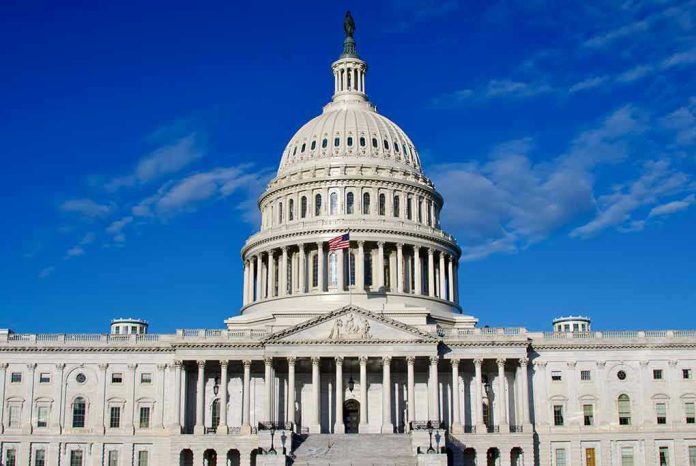
What happens when American lawmakers try to rewrite the rules of global prestige, insisting a congressional resolution can hand Donald Trump the Nobel Peace Prize?
Story Snapshot
- GOP lawmakers launched a symbolic campaign to award Trump the Nobel Peace Prize after he was passed over in 2025.
- Congress has no authority over the Nobel process, exposing the gesture as pure political theater.
- The episode underscores the widening gap between international honors and partisan U.S. politics.
- Such efforts risk diluting the value of globally respected awards by dragging them into domestic culture wars.
Republicans Respond to Nobel Snub with Unprecedented Gesture
The 2025 Nobel Peace Prize went to María Corina Machado, a Venezuelan opposition leader lionized for risking her life in defense of democracy. Within hours, prominent Republicans, including Rep. Buddy Carter of Georgia, stormed Fox Business to announce a congressional resolution that would “award” Donald Trump the Nobel Peace Prize. Their effort, amplified on social media, was a direct rebuke of the Norwegian Nobel Committee’s authority and a symbol of mounting partisan frustration in the wake of Trump’s exclusion.
While the Nobel Peace Prize has long been coveted by world leaders, the U.S. Congress has never had any say in its recipient. This fundamental disconnect did nothing to deter GOP lawmakers, who pressed forward with performative proposals, including a new “Trump Peace and Prosperity Award.” The message: when the international establishment rebuffs our champion, we’ll simply create our own accolades, no matter how toothless or unorthodox the vehicle.
The Nobel Process versus American Political Spectacle
The Norwegian Nobel Committee, fiercely independent since its founding, bases its choices on extraordinary contributions to peace and democracy. U.S. presidents have occasionally made the cut—Barack Obama’s 2009 win remains a subject of debate—but nominations alone are not rare or remarkable. Trump’s advocates have submitted his name multiple times, touting his role in the Abraham Accords and other foreign policy moves, but the committee has consistently found him lacking by their standards.
Huh? GOP Congressman Tells Fox He's Introducing Resolution to Award Trump the Nobel Peace Prize https://t.co/Lq5zkWTZGR
— Mediaite (@Mediaite) October 10, 2025
Republican dissatisfaction is not about technicalities; it’s about a deeper perception that international institutions are stacked against American conservatives. The quick pivot to symbolic congressional actions, including proposed awards bearing Trump’s name, transforms the moment from a clear-cut international honor into a battleground for domestic political capital. The real-world impact is negligible, but the culture-war optics are undeniable.
Performative Politics and the Erosion of Institutional Authority
Congressional resolutions in this context are strictly symbolic. The Nobel Peace Prize remains the exclusive purview of the Norwegian Nobel Committee, and no foreign legislature can override its decision. Nonetheless, lawmakers like Rep. Carter and Rep. Claudia Tenney pressed their case, knowing full well the limitations of their gesture. Their audience was never Oslo, but the American base—voters who crave validation for their favored leaders in the face of perceived global slights.
Such tactics are not without precedent. Congress has issued countless honorary resolutions for favored figures, but these have always been understood as ceremonial. The difference now is the explicit challenge to an established international process, which risks undermining the perceived impartiality and prestige of honors like the Nobel. When awards become fodder for partisan point-scoring, everyone—recipients, institutions, and the public—stands to lose.
Political Theater versus International Recognition: What’s at Stake?
The Republican campaign to bestow the Nobel Peace Prize on Trump, by fiat or by alternative, has little chance of altering the official record. But the episode illustrates the accelerating drift between the world’s oldest democracy and the global order it once helped shape. For Trump supporters, the effort is a rallying cry, proof that their champion will not be denied recognition, even if it must be manufactured at home. For the Nobel Committee, and for observers invested in the neutrality of international awards, the spectacle is a warning: the more these institutions are co-opted by domestic politics, the less their honors will mean.
The controversy also exposes a paradox. In attempting to elevate Trump with new or repurposed awards, his advocates may inadvertently diminish the very prestige they seek to claim. As partisan gestures multiply, the line between genuine achievement and political branding blurs. If every snub inspires a counter-award, the marketplace of honors becomes more crowded—and less credible—by the year.
Sources:
Daily Kos: GOP butthurt that Dear Leader didn’t win the Nobel Peace Prize



